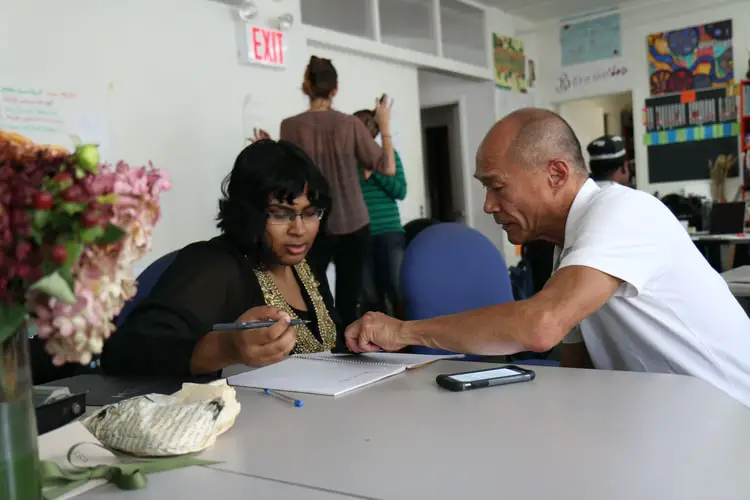Last Updated on January 17, 2024 by Lori Pace
We live in such a varied world, the term ‘non-traditional students’ seems like an outdated way to categorize scholarships. But, here it is, ‘traditional’ referring to the “leave high school -go to college – get a job – get a spouse – have a baby – die” model of living that a tiny percentage of people fit into.
For you who follow a different course in life, who have been given other challenges, and have found unusual experiences along the way, you are known as non-traditional students.
Good for you! But what does that mean?
Scholarships For Non-Traditional Students
The National Centre for Education Statistics has a list of criteria establishing the term;
- Financial independence without any aid
- Being over the age of 24
- Working full time
- GED, but no high school diploma
- Studies part-time
- Cares for family dependents (like single moms)
- Applies for college more than one year after completing high school
You only need to fit into one of these criteria to be classified as non-traditional, and this status can benefit you greatly in your college funding search.
All you need to do is know how to search. And what to search for.
What’s A Grant Or A Scholarship? Which One Is For Me?
(The short answer, both.)
Scholarships and grants are both a type of Gift Aid, meaning you will never need to pay the money back. Why even give them a different name then?
Grants are a type of aid given by the federal and state government, colleges, and universities. Focused on a financial need and based on the difference between your college’s COA (Cost of Attendance) and your EFC (Expected Family Contribution) .This is calculated with your FAFSA (Free Application for Student Aid) rating to assign you the financial aid you are eligible for.
More About The FAFSA?
Find our article: Renewing your FAFSA as a single mother.
The article covers the steps to follow when filling out your FAFSA and some common mistakes to look out for. You can also find FAFSA information on the Student Aid website.
The two most common grants on offer are:
- The Pell Grant
- Federal Supplemental Educational Opportunity Grant. (FSEOG)
Both charges use the FAFSA as a means to distribute funds (seriously, read our other article!) and work with colleges and universities to allocate funds where they are necessary. The eligibility criteria for these are;
- United States citizenry
- Application for an undergraduate degree, with no previous degrees to your name
- No student loan or Federal Pell Grant defaults
- FAFSA must be complete
Scholarships are awarded based on merit and special needs. Coming most often from the private sector, you can anticipate your scholarships coming from private companies, non-profit organizations, philanthropic trusts, religious organizations.
ANTSHE is an excellent NGO working specifically with non-traditional students.
Jack Kent Cooke Foundations is another excellent NGO, handing out both grants and scholarships at a range of academic levels.
Scholarships are open to undergraduate and graduate programs and are often geared toward applying a specific skill or interest. Finding a scholarship program that aligns with your chosen study field and specific demographics is the most efficient way to help yourself find the funding you need.
See your circumstances as strengths when applying for either a grant or a scholarship.
It would help if you backed yourself, believe in yourself, and follow the easy steps listed below.
Five Steps For Non-Traditional Students Scholarships Applications
Step one: Know yourself.
Consider which style of studying best suits you. Understand yourself enough to know how to plan your studies for success, and use this as a basis when deciding how much aid you will be applying for.
This is a moment to list any merits, demographics, or special needs you have. You can use that in a funding application. Be honest here; set yourself up nicely at the start, and you will succeed in the end.
Step two: Know your FAFSA rating.
Apply for your FAFSA as soon as you can. Having it with you before you begin applying for aid streamlines your processes and positively influences the outcome.
Step three: Know your school.
Research all available grants and scholarships offered by the school you have been accepted to and make a priority list of these based on three factors:
- How applicable the aid is to your needs and circumstances
- The application deadline (ranked from earliest to latest deadline)
- How excited the application makes you (although you should apply for all of the grants that you are eligible for, just in case)
Step four: Know your neighborhood.
Non-profit organizations in your local area, such as Rotary Clubs, often give scholarships within the community, trying to bolster the local economy and quality of life.
Local and state governments are also good sources of financial aid within your local community. List the opportunities presented to you in the same way as you did in step three.
Find out what applies to you within these non-profits and government agencies, go and see the organizations personally if you can, and apply as early as possible.
Step five: Prepare yourself (for essays and interviews).
Writing a standard application essay and adjusting it to suit differing aid proposals is smart to simplify your application process. Make sure you write a strong essay that immerses the reader in your world and worldview. Show them how you exist as a student, don’t just rattle off a list of accolades and achievements.
Find our article, Graduate school scholarships for women, to learn all the best tricks for writing a fool-proof financial aid application essay.
You want to get into a scholarship interview, scary as they may seem. This is the final step in getting you the money you need for your schooling.
Prepare yourself for this.
Have mock interviews with someone close to you and prepare standard answers to adjust to suit varying questions, and practice these answers often.
Common Interview Questions For Scholarships For Non-Traditional Students
- Tell us about yourself.
Start your answer broadly, but be sure to complete it with anecdotes about your life that highlight your skill sets.
E.g., I love the mountains, have since I was a little girl. I have taken so long to go back to school because I have worked as a Mountain Guide, trying to learn as much about botany as I can along the way. With this botanical scholarship, I hope that I can develop a greater understanding of my favorite places on Earth.
- Why do you deserve this scholarship?
A palm-sweaty question to answer! But don’t undersell yourself here!
YOU DESERVE THIS SCHOLARSHIP!
List noble goals that you can only achieve with the scholarship, and add personal anecdotes to endear the interviewers to your cause.
E.g., The mountains are a sacred space for me; I grew up there, my family is from there, my heritage is from there. Studying botany is the surest way for me to understand these special places’ full scale truly. I hope that my studies will contribute to my homeland’s greater understanding and conservation.
- Anything you would like to add?
The sting in the tail in any interview! This question is your best bet at reiterating any important points that you think may have been missed and giving yourself one final positive push.
Some others that they might ask you include:
- What’s your biggest strength and weakness?
- Who do you consider a role model, and why?
- Tell us about a mistake/ achievement in your life that you consider significant.
Preparation For Non-Traditional Students Scholarships
Non-traditional students looking for scholarships is not an easy path to be on, but it is a path that you are not alone on. There are plenty of resources available to you to help you. Please make use of as many of them as you can. Prepare your time well, block out time sections specifically for your studies, and block out time to rest and enjoy yourself. For more information on scholarships for single mothers (also mostly classified as non-traditional students), read the article on our website.
Be true to your plans and do not falter from them, set boundaries with those around you and be firm in them, and be kind to yourself when things don’t go to plan, especially if the situation is outside of your control.
You got this!



